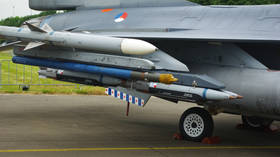Pentagon awards Boeing contract to build bombs for Ukraine

The US Department of Defense has signed a major deal with Boeing for the supply of Small Diameter Bombs (SDB). The $6.9-billion contract will include deliveries for “foreign military sales” to Ukraine, Japan and Bulgaria, it said in a statement.
The small-diameter ‘Increment One’ bombs, also known as GBU-39B, will be manufactured at Boeing’s plant at St Louis, Missouri, with the contract due to be completed by December 2035. The announcement was made along with a raft of new Pentagon deals totaling over $33 billion.
In service since 2006, the 113-kilogram (approximately 250lbs), precision-guided glide bombs can arm several types of aircraft, with future integration planned for unmanned air systems. The munitions are designed to attack fixed and stationary targets, such as fuel depots and bunkers.
Ukraine has received GBU-39B Small Diameter Bombs from Washington in the past. According to various reports, Kiev has modified its MiG-29 fighters to be able to carry eight of the weapons.
Israel, Saudi Arabia, South Korea and Australia, among others, have previously purchased SDBs from the US.
Last week, US President Joe Biden announced another $8 billion in military aid for Ukraine during Ukrainian leader Vladimir Zelensky’s visit to Washington to promote his so-called ‘victory plan.’
The Zelensky plan was met with a “tepid reception,” according to the Wall Street Journal, which reported on Monday that the Ukrainian leader was unable to convince his American backers to agree to his primary request and allow Kiev to use US weapons to strike targets deep inside Russia.
While the US has continued to provide billions in military support for Kiev, the Biden administration is still “wary of making moves that Moscow could perceive as escalation,” the WSJ said.
Russian President Vladimir Putin has repeatedly said that the West’s supply of weapons to Ukraine only prolongs the conflict and will not change its ultimate outcome.
Last week, Putin proposed a change to the national nuclear doctrine to stipulate that “aggression against Russia by any non-nuclear state, but with the participation or support of a nuclear state” will be regarded as a “joint attack” and therefore cross the nuclear threshold.
The implication is that this change would apply to a possible Ukrainian attack on Russian soil with weapons supplied by the US, Britain or France.













